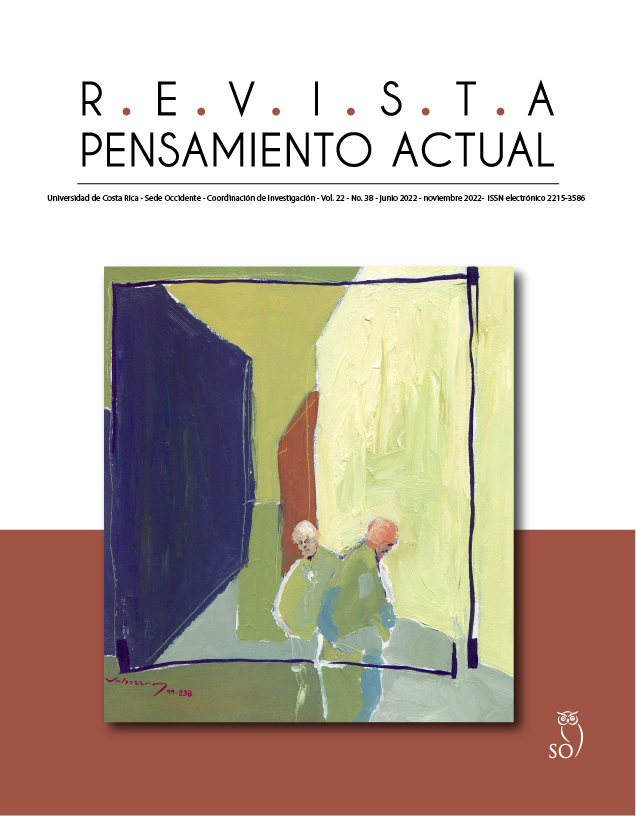Abstract
The paper reflects on the new parameters of the reading approach in Costa Rican educational centers and the constant ministerial assertion that the student develops reading competence, from an approach that places the pleasure and enjoyment of the text over the obligation of said process. The above is done in light of the new approaches to the teaching of language and literature, as well as the scope and impact of the new study program for the subject of Spanish, from the Educational Policy "Ethics, aesthetics and citizenship", of the Ministry of Public Education of Costa Rica. It is up to the Spanish teacher to emphasize the value of reading as an integral process, not only for enjoyment and fun, but as a basic competence for the life of students in society, especially when considering the possibilities of access that exist today to many literary and non-literary works. It appeals to the importance of balancing the training of students who like reading activity, in the different literary and non-literary genres, with the development of people who are aware that reading is not just a space for "leisure, fun and pleasure", but a "necessary" ability to access knowledge, learn about other realities and function effectively in society, because although it is not always enjoyed, due to the diversity of topics and personal tastes, it cannot be an optional practice.
References
Briceño, M., Carmona, M., Trequattrini, I. y Valera, G. (2011). El fomento de los valores responsabilidad y solidaridad desde la Filosofía para niños y niñas. Revista de Artes y Humanidades, 12(2), 190-211. http://www.redalyc.org/articulo.oa?id=170121976010
Cassany, D. (2005). Investigaciones y propuestas sobre literacidad actual: multiliteracidad, Internet y criticidad. Congreso Nacional Cátedra UNESCO Leer y escribir en un mundo cambiante. Concepción, Universidad de Concepción, Chile. http://www2.udec.cl/catedraunesco/05CASSANY.pdf
González, N. (2016). El impacto del didactiquismo en el proceso educativo de la lengua y la literatura en la Educación Primaria: un reto de todos. Revista Pensamiento Actual, 16(26), 71-97. Doi 10.15517/PA.V16I26.25193
González, N., Méndez, M. y Quesada L. (2017). El desarrollo de la competencia lectora y su intervención didáctica desde el enfoque comunicativo en la Educación Primaria. Editorial Sede de Occidente, Universidad de Costa Rica.
Maati, B. (s.f.). El enfoque comunicativo, una mejor guía para la práctica docente. https://cvc.cervantes.es/ENSENANZA/biblioteca_ele/publicaciones_centros/PDF/oran_2013/16_beghadid.pdf
Márquez, A. (2017). Sobre lectura, hábito lector y sistema educativo. Perfiles Educativos, 39(155), 3-18. http://www.scielo.org.mx/scielo.php?script=sci_arttext&pid=S0185-26982017000100003&lng=es&tlng=es
Ministerio de Educación Pública. (2014). Programa de Español para I y II ciclo. Ministerio de Educación Pública.
Ministerio de Educación Pública. (2017). Programa de Español para III ciclo y Educación Diversificada. Ministerio de Educación Pública.
Pindado, J. (2004). El desencuentro entre adolescentes y la lectura. Comunicar, (23), 167-172. https://www.redalyc.org/pdf/158/15802327.pdf
Pompa, Y. y Pérez, I. (2015). La competencia comunicativa en la labor pedagógica. Revista Universidad y Sociedad, 7(3), 160-167. http://rus.ucf.edu.cu/
Programa Estado de la Nación. (2021). Octavo Estado de la Educación 2021. Consejo Nacional de Rectores / Programa Estado de la Nación. https://estadonacion.or.cr/wp-content/uploads/2021/09/Educacion_WEB.pdf
Valenzuela, C. (2021). Discursos de un grupo de docentes sobre el abordaje del eje de investigación en Lengua y Literatura. Revista Actualidades Investigativas en Educación, 21(1), 1-30. Doi 10.15517/aie.v21i1.42492
Villegas, N. (2017). La formación lectora para una docencia integral. Memorias CONISEN Congreso Nacional sobre Educación normal. Mérida, Yucatán México. http://www.conisen.mx/memorias/memorias/4/C200117-J058.pdf

